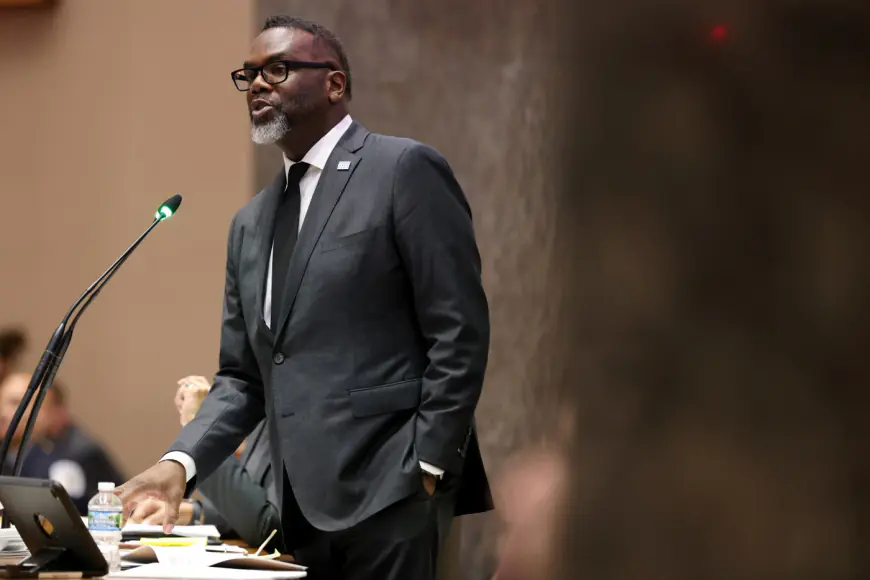Mayor Brandon Johnson postponing Friday vote on 2025 city budget, sources say
Chicago Mayor Brandon Johnson, facing the prospect he doesn't have enough aldermanic votes for his $17.3 billion budget plan, may move council meeting to next week.

Mayor Brandon Johnson has decided to call off a Friday vote on his 2025 budget plan, according to aldermanic and administration sources, the latest setback for the mayor after months of squabbling with aldermen and Johnson’s inability to cobble together enough votes in the Chicago City Council to push through a fiscal plan that has called for property tax hikes and minimal cuts.
Several aldermen told the Tribune that Johnson’s intergovernmental affairs team called late Thursday to say the mayor now hopes plans recess a scheduled 10 a.m. City Council meeting on his $17.3 billion spending plan and reconvene next week, possibly on Wednesday. The delay would be a face-saving attempt by Johnson from an embarrassing and historic defeat on the council floor. But it also would prolong his biggest leadership test yet after a harried stretch of negotiations and narrow approval in two major committees earlier this week failed to get him over the finish line.
The move comes as Johnson, who has portrayed his efforts in devising a budget plan with aldermen as the city’s “collaborator-in-chief,” faces an unprecedented government shutdown should he not secure enough votes by year’s end.
If Friday is not the end of the saga of Johnson’s second budget plan, much will be at stake for Chicago’s fiscal health as well as the mayor’s political future. The council has until Dec. 31 to approve next year’s spending plan before government services shut down and the city’s financial standing risks serious downgrades. The last time City Hall came that close was during the 1980s, during Mayor Harold Washington’s tenure.
Johnson’s revenue plans, including a $68.5 million property tax hike, cleared the council’s Finance Committee in a 14-12 vote on Tuesday, while his spending plan squeaked by 17-16 in the Budget Committee later that day. But in the intervening days, wavering aldermen who were surely weighing their 2027 reelection prospects were reluctant to be one of the decisive votes for an unpopular mayor’s most controversial budget to date.
Johnson’s most recent taxing and spending plan varied drastically from his first proposal in October, which would have closed next year’s nearly $1 billion budget gap with a $300 million property tax increase. That was unanimously rejected by aldermen.
City Hall sources this week told the Tribune that mayoral aides and aldermen close to Johnson were floating an idea to nix the property tax increase entirely and instead reduce next year’s advance pension payment — a sign of how desperate his team was to wrap up this grueling budget cycle.
Those discussions didn’t materialize into a deal, however, and Friday’s package would have preserved Johnson’s latest $68.5 million hike as well as a $272 million supplemental payment to the city’s four pension funds. In the days leading up to the eleventh-hour delay, many holdouts maintained they could not stomach even the revised property tax hike and demanded Johnson’s team trim more fat from various city department budgets. But the pro-labor mayor has flatly refused to consider layoffs.
How Johnson plays his cards will be consequential as he weathers the multiple fronts of his depleting political capital, a series of high-profile personnel controversies and Chicago’s legacy of structural fiscal issues that are by no means solved. Ratings agency S&P has already put the city on credit watch for potential downgrade.
The mayor’s second budget process started off on the wrong foot when he pushed back his budget address by two weeks, a delay compounded by the November presidential election and Thanksgiving holiday. That rankled aldermen who wanted more time to parse through the proposal and engage with constituents and the Johnson administration.
The last time Chicago passed a spending plan in the year’s final month was in 2009, when Mayor Richard M. Daley held the vote for his 2010 budget on Dec. 2.
After all 50 aldermen swiftly shot down Johnson’s proposed $300 million property tax hike, various members requested fresh cuts, ever-changing tax and fee hikes, restored spending or sweeteners to secure their support.
Beyond the smaller property tax hike, Johnson’s revised revenue package boosted streaming and lease taxes to bring in an additional $141 million. He ditched prior proposals to raise liquor and garbage fees and backed down from a controversial move to slash vacant Chicago police jobs tied to federal consent decree compliance after an uproar from accountability advocates.
Other tweaks entailed installing new speed cameras, increasing taxes on garage and valet parking, raising fees on plastic bags at stores and expanding surcharges on Uber and Lyft rides that start or end near downtown. Johnson ultimately did cut hundreds of vacancies — many at the Chicago Police Department — and future programs that would have been funded by federal pandemic relief money such as another round of guaranteed basic income payments. He added new parking enforcement workers to assuage worries about the increase to parking taxes.
Johnson also leaned on a common short-term fix from Chicago mayors: declaring a record surplus from the city’s special tax-increment financing districts, known as TIFs. By surplusing $570 million from the city’s TIF funds, the city would net $132 million and Chicago Public Schools would get $311 million.
Aldermen tolerated smaller property tax increases under Johnson’s predecessor Lori Lightfoot, who argued the city would be better off financially — and the politics would be easier for aldermen — if they gradually increased the rate each year to match inflation. But she took a one-year reprieve during the 2023 election year. Johnson, whose campaign platform included a promise not to raise property taxes, opted to skip the automatic increase again in 2024.
The size of his $300 million property tax hike was a non-starter for many, including Ald. Byron Sigcho Lopez, 25th, a staunch ally who exited council chambers immediately after Johnson’s October address and informed reporters he would be a no on the increase. That set the tone for an arduous battle ahead for Johnson.
But aside from needing to fill that gap — and another $40 million revenue hit from an unexpected flap over botched negotiations with the Illinois General Assembly concerning prepaid cellphone taxes — aldermen bristled at the rhetoric from the Johnson administration that this was the most collaborative and transparent budget process ever.
The mayor has not wavered in that public messaging. Asked immediately after introducing his original budget proposal whether he was concerned over clinching 26 votes, Johnson laughed and said, “Do I look worried?”
The Tribune’s Gregory Royal Pratt contributed reporting.
What's Your Reaction?









































































































